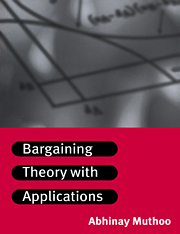3 - The Rubinstein Model
Published online by Cambridge University Press: 24 November 2009
Summary
Introduction
In this chapter I study Rubinstein's model of bargaining. A key feature of this model is that it specifies a rather attractive procedure of bargaining: the players take turns to make offers to each other until agreement is secured. This model has much intuitive appeal, since making offers and counteroffers lies at the heart of many real-life negotiations.
Rubinstein's model provides several insights about bargaining situations. One insight is that frictionless bargaining processes are indeterminate. A bargaining process may be considered ‘frictionless’ if the players do not incur any costs by haggling (i.e., by making offers and counteroffers) — in which case there is nothing to prevent them from haggling for as long as they wish. It seems intuitive that for the players to have some incentive to reach agreement they should find it costly to haggle. Another insight is that a player's bargaining power depends on the relative magnitude of the players' respective costs of haggling, with the absolute magnitudes of these costs being irrelevant to the bargaining outcome.
An important reason for the immense influence that Rubinstein's model has had, and continues to have, is that it provides a basic framework, which can be adapted, extended and modified for the purposes of application. This will become evident in several later chapters of this book.
In the next section I describe and analyse a simple version of Rubinstein's model in which two players are bargaining over the partition of a cake (or ‘surplus’) of fixed size.
- Type
- Chapter
- Information
- Bargaining Theory with Applications , pp. 41 - 72Publisher: Cambridge University PressPrint publication year: 1999
- 1
- Cited by



